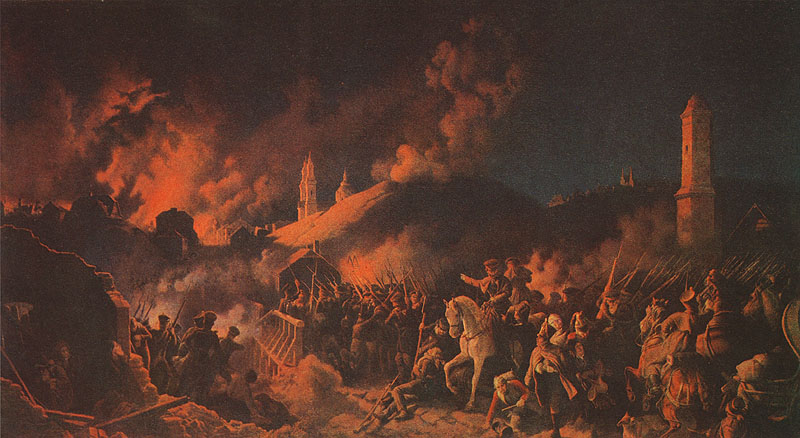|
|

|
|
The event reproduced here is taking us to the other theatre of war - to the troops of Count Petr Khrisianovich Wittgenstein. In time when the memorial events took place in Moscow Count Wittgenstein was by Polotsk in Vitebsk province. Polotsk had been occupied by the corps of french Marshal Saint-Cyr. From the beginning of August both sides were completely inaction but in absolutely different situations in sense of preparation to the further events. While the troops of Count Wittgenstein did not have a lack of anything, the French were suffering the great privations. The nearest province of Pskov was supplying in abundance everything needed not to mention generous donations in amount of more then 14 million rubles. The French were obtaining the provisions with such a big difficulties that Saint-Cyr himself said "Polotsk became a big hospital". These difficulties were aroused by partisan activity developed by Wittgenstein. At the end of September the reinforcement of Petersburg militia arrived in Russian camp and soon the offensive operations against the French began. The battle was started on the 6th (18th ) of October, was very animated and had a variable success. Wittgenstein himself could be captured when he appeared in place of fighting. At the evening the success had come to our side and Saint-Cyr retreated to the fortified camp. The Petersburg militia gained the glory at this battle demonstrating selfless courage. Mikhaylovskiy-Danilevskiy, the historian of the Patriotic war, said: "Bleeding the wounded weren't leaving the battlefield, and others with the last breath were screaming "Forward! Hurray!" The soldiers did not yield the officers. The skirmishers were rushing out of the line at the enemy and were fighting by the butts and axes". The next day Count Wittgenstein had prepared everything for a successive attack. At the end of the day the artillery cannonade began from both sides and at 2 at night our troops rushed in attack. The columns of Generals Vlastov, Dibich and Ridiger advanced. They quickly entered the suburbs but was stemmed by the resisting French before the town. From the Western side one of the regiment of Militia under command of councillor of State Nikolaev had advanced to wooden bridge. The volunteers rushed into the ravine, crossed the river Polota and seized the bridge and making their way with bayonets and axes entered the town -this very moment is displayed on the reproduced canvas. Wittgenstein with other troops was there just before the sunrise. Saint-Cyr was quickly retreating. Unfortunately the French managed to burn all the bridges across Dvina river. That delayed our pursuit and gave Saint-Cyr the ability to reach the roads to Smolensk and to continue the fulfilling of his task to protect the retreat of the French army to Berezina river. But the town became free from the enemies who left there the disgraceful traces of their staying. The Polotskiy cathedral had been devastated and defiled, everything was broken and robbed. The other churches had the same fate been turned into warehouses and stables. The French were there true to themselves demonstrating that war was terrible not only with its battles and blood but to no small degree with merciless and brutal tyranny of occupants that impudently violated the lows of God and the people. The comments are edited by I.N.Bojeyarov. The album "Invasion of Napoleon. Patriotic war of 1812." St.Petersburg, 1911 Prepared for Publication by Poliakov O. Translated by Makarov M. © 1997-1998, Published as part of the project "1812". |